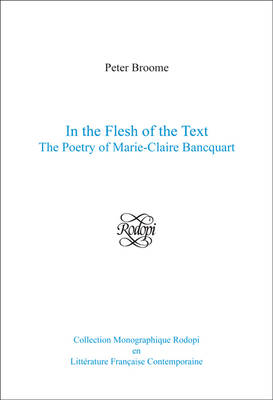
- Afhalen na 1 uur in een winkel met voorraad
- Gratis thuislevering in België vanaf € 30
- Ruim aanbod met 7 miljoen producten
- Afhalen na 1 uur in een winkel met voorraad
- Gratis thuislevering in België vanaf € 30
- Ruim aanbod met 7 miljoen producten
Zoeken
Omschrijving
This closely focused study of the inner movements, dynamic tensions and tactile richness of an intensely sensual but deeply searching poetry, is the first full-length monograph devoted to one of France's foremost contemporary woman poets. Marie-Claire Bancquart's work explores, primarily through the vulnerabilities and sensitivities of the body (hence this book's 'carnal' title), the possibility of releasing a cry: a salvation of language and spirit from indifference, abstraction and dehumanisation, a celebration of a moment's reunion with the recreative vitality of the physical universe, an act of love in its most private yet cosmic expression. Bancquart has described her language as a 'braille of the living': minimal, interrupted and riddled with obscurities and gaps of the unsayable, but apprehending the world and composing its significance in a singularly tactile translation. This study will appeal to those keen to discover one of the most original voices of present-day European poetry, the distinctive poetic resonances of one of its most self-aware and vibrant female sensibilities, and the provocative orientations of 'new writing' traversed by the dilemmas and paradoxes of our own era.
Specificaties
Betrokkenen
- Auteur(s):
- Uitgeverij:
Inhoud
- Aantal bladzijden:
- 272
- Taal:
- Engels
- Reeks:
- Reeksnummer:
- nr. 47
Eigenschappen
- Productcode (EAN):
- 9789042023666
- Verschijningsdatum:
- 1/01/2008
- Uitvoering:
- Paperback
- Formaat:
- Trade paperback (VS)
- Afmetingen:
- 155 mm x 234 mm
- Gewicht:
- 381 g

Alleen bij Standaard Boekhandel
+ 268 punten op je klantenkaart van Standaard Boekhandel
Beoordelingen
We publiceren alleen reviews die voldoen aan de voorwaarden voor reviews. Bekijk onze voorwaarden voor reviews.








